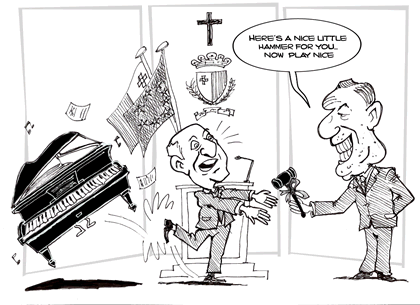
EDITORIAL | Wednesday, 7 May 2008 A political masterstroke, but unfair
Lawrence Gonzi’s promise of a “government for all the Maltese” risks being remembered as the shortest-lived electoral pledge of all time.
On Monday, the Prime Minister announced his government’s decision to nominate former education Minister Louis Galea as interim speaker of the House of representatives: an important post, which Gonzi himself described as the fifth most powerful political position the Republic has to offer. Before analysing the implications of this nomination, one must point out that under ordinary circumstances, Dr Galea would be an ideal choice for Speaker. His 32 years in parliament make him one of Malta’s most experienced politicians; and besides, in his multiple portfolios over the years, Dr Galea has always performed capably and effectively… albeit with some damning accusations of cronyism that resulted in inquiries over the Auxiliary Workers Training Scheme and the Foundation for Tomorrow’s Schools. But circumstances are not ordinary, and the decision of who will occupy the Speaker’s seat is one which has weighty implications for the government’s precarious hold over parliament, and also for the Opposition. After the March 8 election, which saw the PN’s nationwide support drop by 2.5 percentage points, Gonzi now presides over a government representing 49% of the Maltese people. Thanks to a Constitutional amendment brokered between the only two represented parties in 2007 – and, it must be said, with only the same two parties’ interest in mind – it has also benefited from an extra five seats to compensate for its minority in the House. This enables the current administration to govern with a single-seat majority, in spite of the fact that five of its seats in parliament are, theoretically at least, bogus. To add to Gonzi’s woes, one of his government’s seats is currently occupied by Jeffrey Pullicino Orlando, whom many Nationalist voters believe should be removed from the party for apparently misleading the electorate over the extent of his involvement in the Mistra development saga. It is no exaggeration to state that Dr Pullicino Orlando currently represents the Prime Minister’s biggest headache for the coming legislature: for the Zebbug MP cannot be expelled from the party without also costing the government its parliamentary majority; and for the same reason, Pullicino Orlando cannot be eternally sidelined, as he retains the ability to withhold his vote for the government (though whether he will do this or not is another story altogether). Either way, the crux of the matter is that Dr Gonzi cannot govern comfortably with his current parliamentary set-up. This is the context within which Monday’s announcement must be viewed, and from this angle, it clearly emerges that the Prime Minister’s chief prerogative was to reinforce his precarious hold on government by surreptitiously gaining an extra seat in Parliament, while depriving the Opposition of a similar advantage. From a purely political perspective, it can be described as a masterstroke. Gonzi told journalists that the decision was taken after Cabinet rejected the Labour Party’s interim offer to retain the present Speaker and Deputy Speaker until the new Opposition leader is sworn in after June 5. The official reason was that it would be unfair to expect Dr Anton Tabone to occupy the position only for two months, after which he would automatically be forced to resign. Meanwhile, Monday’s offer has the outward appearance of an acceptable compromise: for if his nomination is rejected by the Opposition, Louis Galea has already accepted to resign in two months’ time. Meanwhile, the government has made the second position – that of Deputy Speaker, currently offered to Labour’s Carmelo Abela – conditional on a pairing agreement which would greatly alleviate Dr Gonzi’s above-mentioned governability problems. Herein lies the subtle manoeuvre: for while Dr Carmelo Abela is an elected representative, Dr Louis Galea is not. So the acceptance of Galea as speaker would automatically boost the PN’s parliamentary majority by one seat, while doing nothing to increment the Opposition’s parliamentary presence. Suddenly, from a four-seat minority, the PN has engineered for itself a two-seat majority… which would allow the government to comfortably cut loose Jeffrey Pullicino Orlando at will, as he would no longer occupy the single seat that keeps the PN in power. Naturally, the Opposition can always reject the offer, but in so doing it would also lose the privilege to appoint its own deputy speaker. On the other hand, the government is empowered to appoint Dr Galea regardless, and be compensated for the lack of a pairing agreement with his casting vote when requiredan extra seat. As things stand, the only card for the Opposition to play is to withhold the pairing agreement, and lose the position of deputy speaker in the process. This would certainly make life difficult for the government, but nowhere near as difficult as retaining a single-seat majority, which is the situation as it stands today. Naturally, there is a third available opportunity, which would be for the government to nominate Louis Galea as speaker, but at the same time allow the Opposition to also nominate an unelected representative of its own as deputy. This would restore the natural parliamentary equilibrium – which does not favour government – and make for a truly representative parliament according to the express wishes of the electorate. But is now apparent that Dr Lawrence Gonzi is concerned with restoring the Nationalist Party to the power it enjoyed before an election which punished him severely. Far from a “government of all the Maltese”, it seems we are looking at a “government for all the Nationalists.” Any comments? |
MaltaToday News |
Managing editor Saviour Balzan | Tel. ++356 21382741 | Fax: ++356 21385075 | Email
